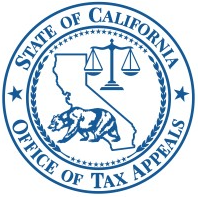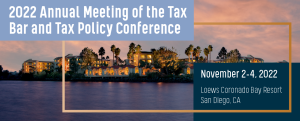
The California Attorney General has confirmed the Office of Tax Appeals (OTA) may decline to apply a tax regulation in a taxpayer appeal if it conflicts with the relevant statute. OTA must afford appropriate deference to the issuing agency, but its authority extends to setting aside the regulation for that appeal. OTA lacks authority to invalidate or repeal the regulation more broadly or to apply its conclusions outside the specific appeal.
 SeeSALT Blog
SeeSALT Blog


 The May Revision of California’s 2024-2025 state budget seeks to block refund claims, worth approximately $1.3 billion for historical tax years, and $200 million per year going forward, by codifying informal guidance recently rejected by the Office of Tax Appeal’s (OTA) decision in the
The May Revision of California’s 2024-2025 state budget seeks to block refund claims, worth approximately $1.3 billion for historical tax years, and $200 million per year going forward, by codifying informal guidance recently rejected by the Office of Tax Appeal’s (OTA) decision in the 

 The New Mexico Court of Appeals decided a case illustrating the heavy risks of failing to comply with a court’s order. Specifically, the Court of Appeals upheld the District Court’s full dismissal of a taxpayer’s refund claim for violating a discovery order. In Bowman v. Manforte, the taxpayer sought a refund of Gross Receipts Tax arguing that her income was exempt as wage income rather than income from an independent business. The New Mexico Department of Revenue Services (“Department”) suspected the taxpayer’s federal tax return would reflect deductions against the income that would be permitted only if the income were business income and not wages for federal income tax purposes. The taxpayer refused to produce the federal tax return, claiming that the return was privileged from civil disclosure under New Mexico’s tax secrecy law. The Department brought the taxpayer’s refusal before the District Court and twice obtained orders requiring the taxpayer to produce the return. After the taxpayer failed to comply with the disclosure orders, the District Court took the dramatic step of dismissing the taxpayer’s refund claim altogether. The taxpayer appealed to the Court of Appeals.
The New Mexico Court of Appeals decided a case illustrating the heavy risks of failing to comply with a court’s order. Specifically, the Court of Appeals upheld the District Court’s full dismissal of a taxpayer’s refund claim for violating a discovery order. In Bowman v. Manforte, the taxpayer sought a refund of Gross Receipts Tax arguing that her income was exempt as wage income rather than income from an independent business. The New Mexico Department of Revenue Services (“Department”) suspected the taxpayer’s federal tax return would reflect deductions against the income that would be permitted only if the income were business income and not wages for federal income tax purposes. The taxpayer refused to produce the federal tax return, claiming that the return was privileged from civil disclosure under New Mexico’s tax secrecy law. The Department brought the taxpayer’s refusal before the District Court and twice obtained orders requiring the taxpayer to produce the return. After the taxpayer failed to comply with the disclosure orders, the District Court took the dramatic step of dismissing the taxpayer’s refund claim altogether. The taxpayer appealed to the Court of Appeals.